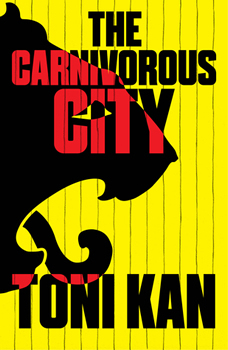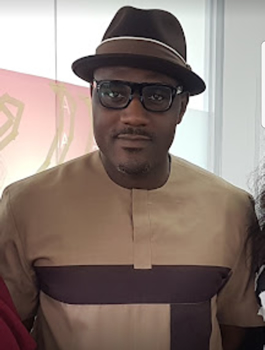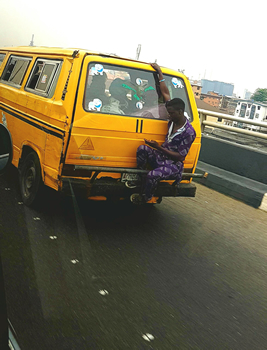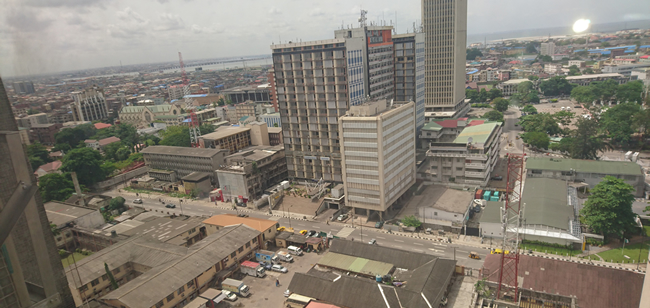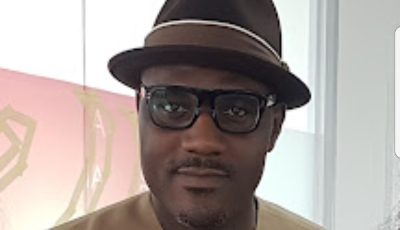

Africa Scene: Toni Kan
When Trust Is a Shapeshifter
Toni Kan is a creative writer, biographer, editor, and public relations expert. Kan, who was educated at the University of Jos and the University of Lagos, became a magazine editor at the age of 26. He lives in Lagos and has explored his city in poetry and short stories, culminating with THE CARNIVOROUS CITY. He was the recipient of the NDDC/Ken Saro Wiwa literature prize, awarded by the Association of Nigerian Authors (ANA), in 2009.
Abel Dike leads a quiet life as a teacher in a regional town when he receives a brief message that his brother, Soni, is missing. He knows that Soni is a criminal—and a very successful one—and they have an ambivalent relationship, but he immediately heads for Lagos to try to discover what has happened. He takes on the carnivorous city. Although he moves into his brother’s mansion, over the next few days he is exposed to the extremes of Lagos. I asked Toni Kan about his concept for this riveting crime novel.
THE CARNIVOROUS CITY has a powerful sense of place—in fact, it’s really a book about Lagos. Did you conceive the novel as an inside look at the city through the eyes of an outsider, or did this develop with the story?
The intention was to write a love song to Lagos, which I have called home for the last 25 years. Lagos has always fascinated me just like other cities have fascinated other writers: Dickens with London, James Joyce with Dublin, Doctorow with New York, Hugo with Paris.
So, yes, it was intentional and the plan was to map Lagos in words, to provide readers with what you could call a Lagos forged out of words. A friend of mine recently traced a path from Victoria Island to Bajulaiye, using my book as a guide.
I want to do this in all the novels I write so that in years to come, people can pick up my book and catch a brief history of Lagos at particular epochs.

Lagos evening traffic
Abel finds himself completely out of his depth in Lagos. He relies on Santos, his brother’s sidekick, to help with the search for his Soni, and to sort out myriad financial problems, but it’s not long before he discovers that Santos, too, has his own agenda. How did you conceive Santos’s role in the novel?
In Lagos, everyone wants to “hammer” and hammer is shorthand for “making it,” and making it can take different forms. Santos is a bit player in an epic movie, but after a bit player has studied the major players long enough, he convinces himself that he can step into that role.
It’s a conceited belief that often leads to sorrow and sometimes worse, as we see in his case.
I had to have someone like Santos provide that counterpoint. He is in many ways like Soni, but in many ways unlike Soni. He knows he will never amount to anything, but he will either get rich or die trying—like 50 Cent sang. I needed him to show another side of the criminal enterprise.
People like Santos are one-trick ponies. Even if they manage to land a deal, they will mess it up. See what happens when he tries to get money from Ada and Abel. Once Ada attacks, he buckles fast: “Santos staggered to his feet, his face a mixture of rage and confusion. This was not in the script.” They follow a script and they can’t improvise.
You were faced with developing Soni as a three-dimensional person without having him onstage. He could have been the stereotyped brother who went wrong, but he develops as a sympathetic character despite his lucrative illegal operations. He loves his family, helps strangers, idolizes Abel, all while reveling in the wealth generated by his underworld deals. Was it important to make him sympathetic so that the reader would care about the search for him?
It’s the Robin Hood effect, isn’t it? I liked writing Soni. He is a composite of about four people I know, real people. I wanted a funny person, a charming personality, a kind-hearted scam artist, and a lover boy—irresistible qualities in a man. But he was, all said, a criminal and no role model. We love him because, I think, crime for him was not necessarily a means to an end, it was a life style he chose, something he was good at, and you have to admire skills like that.
In fact, there are no real villains in this novel. Everyone is trying to make a go of it in the corrupt and fluid environment generated by the carnivorous city. As you write: “in Lagos… trust is a shapeshifter, a mercurial being with ever-shifting allegiances.” Is it Lagos that is the true villain?
Lagos gets to you. It is the real bad guy. Watch out or get swallowed whole.
Abel struggles to avoid the temptations of his brother’s lifestyle. He is grounded only by a previous girlfriend, Calista (who turns out to have political connections herself), and the detective searching for Soni (who actually does his job without a requiring a bribe, although he is open to unsolicited presents along the way). Was it really Abel’s struggle to maintain his personal values that you wanted to explore?
I wanted to explore the attrition not just of innocence, but of morals. It is the Heart of Darkness and Lord of the Flies. How do you hold up in an environment where the rules are lax and the end justifies the means? In Lagos, Abel’s certainties and moral exactitudes kind of slip away. He has money, he can buy anything and anyone he wants, and he can finally look at someone and ask the infuriating Nigerian question: Do you know who I am?
That question is arrogance and emasculation rolled into one, and speaks to the erosion of empathy in Abel, who used to be a rational intellectual.
Abel has a fairly casual attitude to sex and is attracted to Ada, his sister-in-law—and the attraction is reciprocated—but he feels that it would be a betrayal of Soni. Is this the one line in the sand he draws for himself?
I try not to make moral judgments in my writings. I am a Christian, but my novels are not Christian texts or moral codes. They are entertainment, slices of life that reflect our society and the way we engage with it. In that sense, I present characters who grapple with life on their own terms. Abel is a young man going through the most difficult time of his life. His brother is missing, he is suddenly rich beyond his wildest imagination, and he has his brother’s ambitious and calculating wife to contend with.
With Calista, it is nostalgia and therapy, but with Ada, I sense that it is more of strategy. Ada could be a formidable opponent and getting in bed with her would be the smart man’s move. So, there is morality and then there is exigency.
You have published work that spans several different genres, but I gather THE CARNIVOROUS CITY is the first of a trilogy set in Lagos. Could you tell us something about the sequels?
The next novel was originally called Taxi Driver and I had done a bit of writing and a few well-received readings around it, but the story wasn’t going quite right so it has been dropped, and I am currently working on Time Never Passes, which is a Lagos story spanning close to two decades. It’s a revenge story that plays out in Lagos and London and the desert. It is an expanded version of one of my most popular short stories, “Devil’s Overtime,” which was in my short story collection, Nights of the Creaking Bed.
The third one is tentatively titled Shayo and is about an investigative journalist battling an alcohol addiction in Lagos.
I’m looking forward to them!
- International Thrills: Femi Kayode - March 29, 2024
- International Thrills: Shubnum Khan - February 22, 2024
- International Thrills: Why Read African Thrillers? A Year in Review - December 15, 2023

